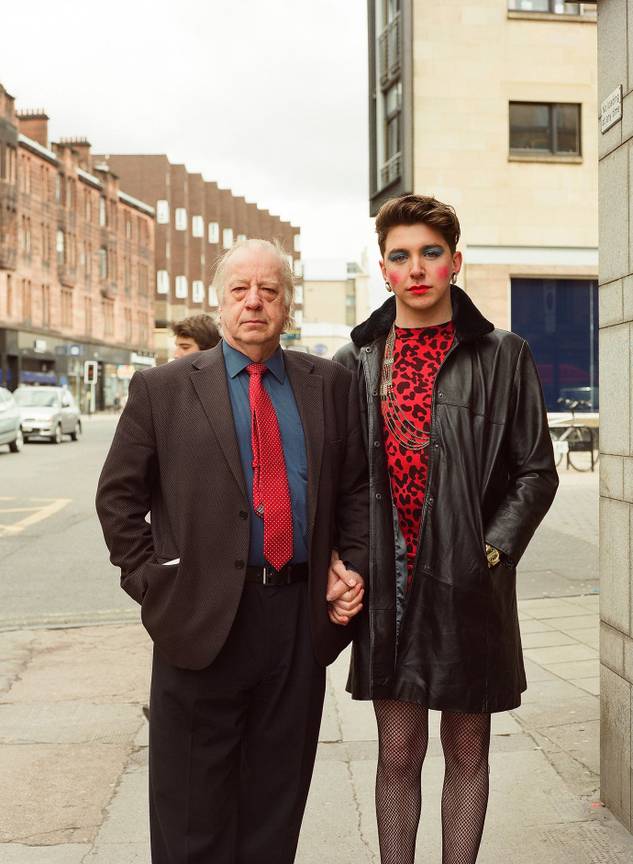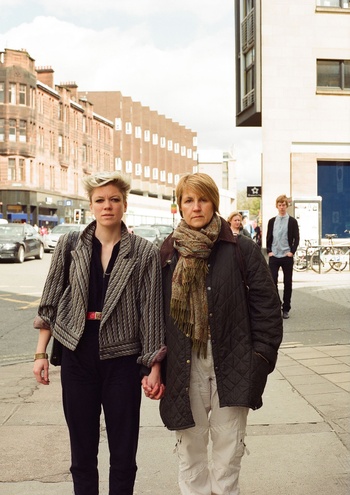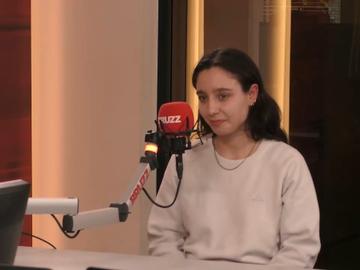What could be more innocuous than holding hands in public? It isn’t so for everyone, as the Scottish artist Rosana Cade demonstrates with a participative performance that might just change the way you see the world around you forever.

© Rosie Healey
| 'Walking:Holding' invites complete strangers to walk through town while holding hands.
'Holding hands with someone you don't know can be freeing and uplifting'
Rosana Cade
- Was born in the mid 1980s
- Studied Contemporary Performance Practice at The Royal Conservatoire of Scotland, class of 2011
- The award-winning Walking:Holding was performed for the first time in 2011 in Glasgow, and has been touring for nine years, on 40 different locations (including Mons in 2015)
- Co-founded //BUZZCUT// in 2012, an internationally recognised organisation supporting radical performance practices from all over the world
- Works in various collaborative partnerships
- After performing Drag Mother in december 2019, Cade is coming back to the Beursschouwburg with Walking:Holding
Loads and loads of people got in touch very quickly and we had a list of too many,” says Rosana Cade, who has been pleasantly surprised by the enthusiasm generated by her appeal to the population of Brussels, posted online a few weeks ago. “Be part of the performance in Brussels, no experience needed. Get in touch here!”
The message went on: “I would like to work with people who are as different to each other as possible, e.g. a range of ages, backgrounds, genders, sexualities, appearances, and identities.” You might have seen the announcement. Perhaps you are even part of the adventure. If so, you know that you will be strolling through the streets of Brussels on three consecutive days, holding hands with complete strangers who have come to see the performance Walking:Holding hosted by the Beursschouwburg.
Moved by their own experiences as a queer person, Rosana Cade, a performance artist who lives in Glasgow, began to develop the performance in their hometown in 2011 as a way of questioning and exploring the act of holding hands in the street. Walking:Holding has since been performed in forty cities around the world.
An everyday insignificant gesture of affection for many of us. A magnet for people’s stares, a risky business, and sometimes a statement for couples whose appearance challenges the established heteronormative model that is deep-rooted in our societies. It’s a unique opportunity for the audience to put themselves in the shoes of “the other”, to gain an awareness of the social mechanisms involved, and above all to celebrate the diversity of identities out in the open and in plain sight.
Walking:Holding has been going since 2011. Can you tell us more about the evolution of the performance?
Rosana Cade: I had been making a lot of work that explored issues around gender and sexuality, responding to my own experiences as a queer person, but a lot of that work was happening inside arts venues, in theatres, museums, and art galleries. I realized I felt often quite safe within those spaces and within the art world, but when I stepped outside into the streets of Glasgow, where I lived, I felt quite different and would often feel uncomfortable holding my partner’s hand in public. I felt I really wanted to make a piece of work that would happen in public space and outdoors.
Do you consider Walking:Holding a political act?
Cade: I do, yes. I think if you are someone with a marginalized identity and someone who might suffer oppression in public then to be in public and to take some space can be a political act. There’s this quote that says: when a transgender person is walking down the street, they’re not walking solo, there is a whole group of people walking with them and if something happens to them, then it happens to the whole group. When I am acting out queerly in public it’s as much about being intimate with my partner as it is about saying this is a place where queer people are allowed to be.
I am coming with an open mind and hoping we have a range of people in Brussels
But, in doing so, you are taking a risk and potentially putting yourselves in danger.
Cade: That’s true and it’s one of the interesting and difficult things about the piece: when we first did it in 2011 in Glasgow, on the second night we were to perform, there was a football match on in town. It was Saint Patrick’s Day and the venue decided that we had to cancel the performance because they felt that we’d be putting members of the public in danger. I was really disturbed about that whole situation because I thought all we are asking to do is walk and hold hands and that should be a human right and people should be able to do that whenever they want. But if you are someone who lives with that identity, you just cancel your life for the evening. And people do, they don’t go out and show who they are.
But I have to say that, having done it for nine years now, in a lot of different spaces, the overall response is one of extreme positivity and there’s been very few instances of anything negative happening. Often, people come to do it who are normally too scared to hold hands with their partner and, through doing this, they realise it’s fine and they should be allowed to do it.
How do you get in contact with your performers in each town and how do you choose them? How do you make sure you find the people you are looking for?
Cade: We work directly with venues, so in this case Beursschouwburg in Brussels. And we have some material, such as a letter from me. We have some videos and we ask the venue to try to spread the information widely. I want it to be self-selecting, it is important to me that people hear about the project and then, if they think it’s something that would be interesting for them, decide they want to do it.
How do you come up with the itinerary for the members of the public to follow?
Cade: I’ll be thinking about what the participants told me about that area, places that have a particular significance to them, and I would have done some research about the area already. I’ll be walking around thinking what does this place tell me about gender, about power, about behaviours that are expected? I’ll try to plan places where you are very visible and places where it is very quiet and perhaps you are not very visible. We also look for points of reflection. Because when you are the audience member, some people get very engrossed in the interaction with the performer and they are not thinking about what is happening between them and the people in the street. It just gives you a reminder of the perspective on the performance.

© Rosie Healey
| Rosana Cade (left): “Holding hands can make you feel very exposed but it can also feel so kind and caring, like you are being looked after.”
Diversity is an important feature of your group of performers. Is it also important when it comes to the audience?
Cade: I feel like, with a lot of the work I do, I would love for it to feel like something a wide range of people can come to. I guess that’s not something we have a lot of control over. Often, people are quite nervous about it, and we have found we don’t get many men coming. Maybe it’s more, kind of, risky or scary for a man to hold hands with another man. But that isn’t always the case, so I am coming with an open mind and hoping we have a range of people in Brussels.
Do you know if people speak a lot while walking in the streets?
Cade: The interactions vary and what’s important is that it isn’t scripted in any way. We want it to feel like a genuine exchange. Actually, there’s so much going on that silence can be the best way to experience it and feel what’s happening.
What benefits of physical contact through holding hands have you observed among your performers and audience members?
Cade: If you stand side by side with someone and hold hands, there’s something very levelling and human about it. The other thing is that you are both facing the same direction. There have been studies done about how if you are standing opposite someone, you are less likely to come to an agreement than if you are both walking the same way. And there’s loads of scientific studies around the importance of actual contact with human beings, how it’s very good for our mental health, how it releases endorphins. It’s a freeing and uplifting thing to just be held and hold hands with someone who is not your intimate partner. It can make you feel very exposed but it can also feel so kind and caring, like you are being looked after. Another conversation that often comes up is that, when you are not in an intimate relationship and you don’t have close family members, where are the opportunities in your life for human contact? We are living in a time when more and more people are dealing with loneliness.
We are living in a time when more and more people are dealing with loneliness
You have done Walking:Holding in forty different locations. Have you noticed a big difference between the experience of performing in a big city and in a little town, and between performing at home or abroad?
Cade: I grew up in a small town, so I am interested in doing this kind of work in smaller towns. It did do it in Mons (in 2015, as part of Mons Capitale Culturelle, NDLR) a few years ago. If you do it in a bigger city there will be a lot of queer people and people who are already engaged in some of these issues. In a smaller town, it’ll be harder to find queer people because those places are harder to live in and then perhaps the way things are discussed will be different. People do feel much more visible walking around in smaller places.
When you travel from town to town with your performance, you are only operating with a limited number of people and within a limited time period. Is there a next step to try to perpetuate the work you have done in the places you have been?
Cade: The work is definitely very small in terms of who encounters it. I do some projects that are much longer in places, but I feel like one of the qualities of Walking:Holding is that it’s really about fleeting moments of intimacy. But, at the same time, I am interested in social change and, after so many years of doing the performance in so many different places, I was thinking about how I can share it with different people. That’s why I started making a film about it. Something I am also interested in is whether it can offer something outside of an art context. I am interested in whether it is a useful tool for people who work in the city, like city planners or people who make the rules about the city, or the police, or people working on the street. I would like to explore the benefits it could have, potentially working with professionals and applying the process in different ways.
Read more about: Podium , Beursschouwburg




Fijn dat je wil reageren. Wie reageert, gaat akkoord met onze huisregels. Hoe reageren via Disqus? Een woordje uitleg.